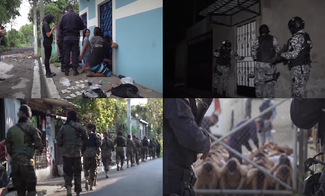| Salvadoran gang crackdown | |||
|---|---|---|---|
| State of Exception / War Against the Gangs Part of the Territorial Control Plan and the war on drugs[1] | |||
 Clockwise from top left: the detention of suspected gang members by the police, a police search of a house, imprisoned gang members, soldiers on patrol in the streets | |||
| Date |
| ||
| Location | |||
| Status | Ongoing | ||
| Parties | |||
| Lead figures | |||
Non-centralized leadership | |||
| Number | |||
| |||
| Casualties | |||
| Death(s) | |||
| Arrested | 83,100+ (as of 5 November 2024[update])[6] | ||
| ||
|---|---|---|
|
Political offices
Elections
Media gallery |
||
The Salvadoran gang crackdown, known in El Salvador as the State of Exception (Spanish: régimen de excepción) or the War Against the Gangs (guerra contra las pandillas), began on 27 March 2022 in response to a series of homicides committed by criminal gangs between 25 and 27 March 2022 which killed 87 people. After the killings, the Salvadoran government declared a state of emergency that suspended several constitutional rights and enabled the government to launch mass arrests of suspected gang members. The crackdown and state of emergency have since been extended 32 times as of 5 November 2024[update].[6]
As of 5 November 2024[update], over 83,100 people accused of having gang affiliations have been arrested,[6] which has overcrowded El Salvador's prisons and has led the country to have the highest incarceration rate in the world by 2023.[7] As of 16 May 2023, 5,000 people who were arrested have been released.[8] In January 2023, Minister of Defense René Merino Monroy announced that the government registered 496 homicides in 2022, a 56.8% decrease from 1,147 homicides in 2021. He attributed the decrease in homicides to the gang crackdown.[9] That same month, the government opened the Terrorism Confinement Center (CECOT), a prison with a capacity for 40,000 prisoners.[10]
Domestically, the crackdown has been popular among Salvadorans, many weary of gang violence. Conversely, human rights groups expressed concern that the arrests were arbitrary and had little to do with gang violence, and several U.S. government representatives expressed concern about the violence in the country and the methods used to combat it; these comments were criticized by Salvadoran president Nayib Bukele. Politicians across Latin America — in countries such as Chile, Colombia, Costa Rica, Ecuador, Guatemala, Honduras, and Peru — have implemented or have called for the implementation of security policies similar to those implemented by Bukele.[11]
- ^ Alpeyrie, Jonathan (10 August 2023). "The War on Drugs in El Salvador: A Success Story?". Geopolitical Monitor.
- ^ Valencia, Roberto (22 September 2023). "How El Salvador's Police Creates, Uses Its Gang Database". InSight Crime. Retrieved 7 October 2024.
- ^ Breda, Tiziano (29 March 2023). "Why El Salvador's Anti-Crime Measures Cannot (and Should Not) Be Exported". Istituto Affari Internazionali. Rome, Italy. Retrieved 7 October 2024.
- ^ "At Least 261 People Have Died in El Salvador's Prisons Under Anti-Gang Crackdown, Rights Group Says". Associated Press. San Salvador, El Salvador. 10 July 2024. Retrieved 13 July 2024.
- ^ Herrera, Yelter (4 October 2024). "Gustavo Villatoro: Pandilleros Tienen Derechos Humanos, Pero Están Reducidos" [Gustavo Villatoro: Gang Members Have Human Rights, But They Are Reduced]. El Mundo (in Spanish). Retrieved 4 October 2024.
- ^ a b c Magaña, Yolanda (5 November 2024). "Aprueban Prórroga 32 del Régimen de Excepción con Más de 83,100 Capturados" [They Approve the 32nd Extension of the State of Exception with More Than 83,100 Captured]. El Mundo (in Spanish). Retrieved 6 November 2024.
- ^ "El Salvador Is Imprisoning People at Triple the Rate of the US". Bloomberg.com. 12 September 2023. Retrieved 30 October 2023.
- ^ "Ministro de Seguridad confirma liberación de 5 mil detenidos durante el régimen de excepción". La Prensa Gráfica (in Spanish). 16 May 2023. Archived from the original on 21 May 2023.
- ^ Renteria, Nelson (3 January 2023). "El Salvador Murders Plummet by Over Half in 2022 Amid Gang Crackdown". Reuters. Archived from the original on 3 January 2023. Retrieved 5 January 2023.
- ^ Murray, Christine; Smith, Alan (6 March 2023). "Inside El Salvador's Mega Prison: The Jail Giving Inmates Less Space than Livestock". Financial Times. Mexico City and London. Archived from the original on 7 March 2023. Retrieved 8 March 2023.
- ^ Linthicum, Kate (25 July 2023). "Inside the Growing Cult of El Salvador's Nayib Bukele, Latin America's Political Star". Los Angeles Times. Mexico City, Mexico. Archived from the original on 25 July 2023. Retrieved 15 August 2023.

